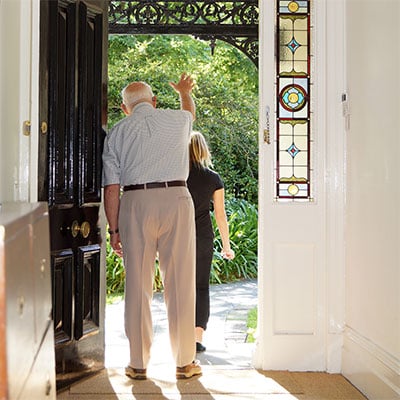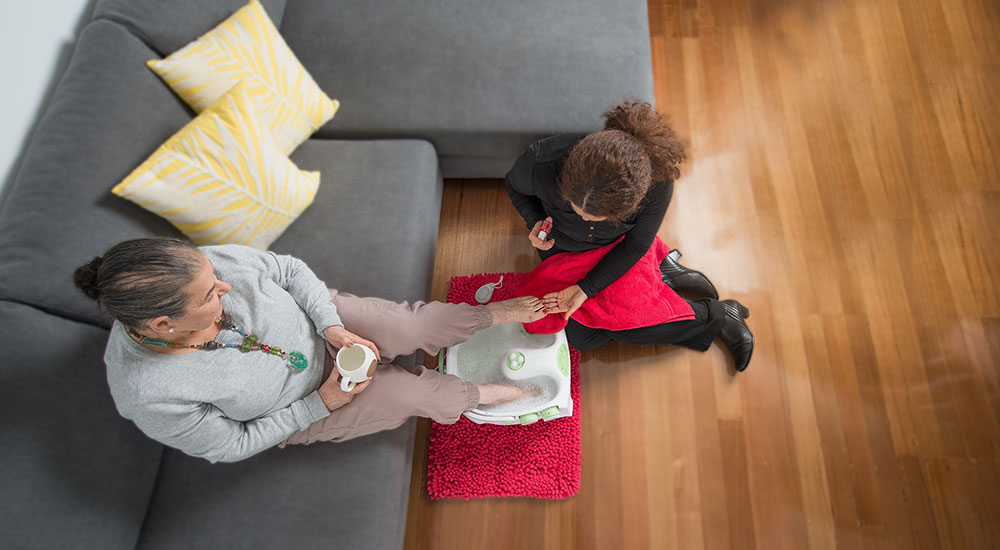Choosing between privately funded and government funded in-home care can be a complicated process. Through the Federal Health Department’s My Aged Care service, you can get access to a wide range of Government funded and a wide range of subsidised in-home care. Sometimes the process of applying and getting access to these services can be time consuming and tedious. Not everyone has the luxury of time to wait for an approval.
Organising privately-funded care through a provider like Absolute Care & Health can be a simpler process. Fewer stages of application and assessment can help you find the ideal caregiver and care plan to suit your needs a lot faster. Absolute provides a clear outline of prices and services on offer from the very beginning.
How to get started
Private
1. Contact Absolute Care & Health via phone, email or online form to discuss our care options and your lifestyle goals to determine the best possible care for your circumstances
2. A free, no-obligation in-home care assessment is carried out by a registered nurse and client manager who meet you in person, talk about your lifestyle preferences and care needs to find a suitable carer for you
3. A care plan is established with a breakdown of pricing
Government
1. Your application starts with a phone call to the My Aged Care hotline 1800 200 422
2. The government’s My Aged Care service will arrange for a care assessment to be carried out by the Aged Care Assessment Service (ACAS).
3. A trained assessor (usually a nurse or social worker) arrives at your home to assess your care needs, and to develop a support plan which addresses your needs, goals and preferences.
4. If your income is over about $27,000 a year, you’ll need to have an income assessment carried out by the Department of Human Services to determine if you will need to contribute to the cost of your care.
5. You’ll receive a letter telling you if you have been approved for a Home Care Package and what level you are placed at. You may then still need to wait for a Package to become available and allocated to you. There is a national waiting list, and you can find out where on the list you are from My Aged Care.
Payment options
Private
1. We charge clear and simple hourly rates for most of our services
2. We don’t have lock-in contracts. This means your care is flexible. You can increase or decrease your care to suit your changing needs.
Private care can be used in conjunction with government funded care as a ‘top up’ for extra support, hourly rates are the same for private as they are for government care.
Government
Home Care Packages
1. Funding packages are based on care requirements originally decided by an ACAS assessment. There are four levels depending on your needs.
2. You may be required to contribute towards the cost of your care. If your income is over about $27,000 a year, you will need an income assessment.
3. Your care provider will charge a fee for administration and management as well as care services they provide for you. This fee will come out of your total Home Care Package amount.
4. The Australian Government subsidy is paid directly to your chosen provider against the services provided.
Services offered
For both private and government, services are provided based on what you need. No matter how you’re funded, you can get the same access and same range of care services.
Our care services include:
1. Personal services such as assistance with bathing, showering, toileting, dressing and undressing, and communication.
2. Assistance with nutrition, hydration, and meal preparation. This includes special diets for health, religious, cultural or other reasons, assistance with using eating utensils and with feeding.

3. Domestic support e.g household cleaning, gardening, laundry, grocery shopping, cooking and meal preparation, general home maintenance, after hospital care, dementia care.
4. Assistance with mobility and dexterity such as providing crutches, quadruped walkers, walking frames, walking sticks, mechanical devices for lifting, bed rails, slide sheets and tri-pillows.
5. Nursing, allied health and other clinical services including speech therapy, podiatry, occupational or physiotherapy services, hearing and vision services.
6. Transport and personal assistance with shopping, visiting health practitioners and attending social activities.
7. Management of skin integrity including assistance with bandages, dressings and skin emollients.
8. After hospital and ongoing care including nursing, pain and wound management, bathing and dressing, medication management, post-operative care, end-of-life care.
9. Cultural understanding, multilingual caregivers, choice of male or female caregivers, LGBTI awareness.



